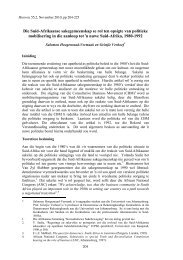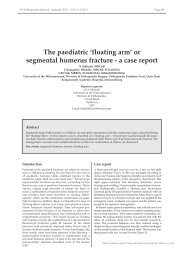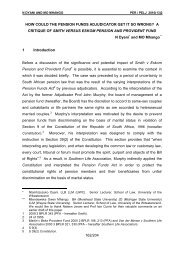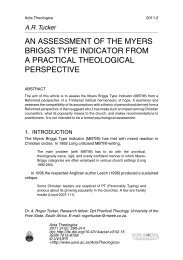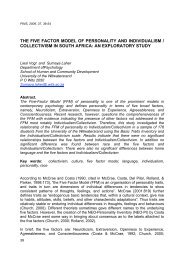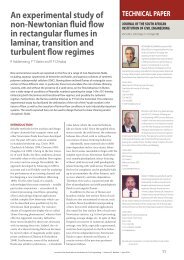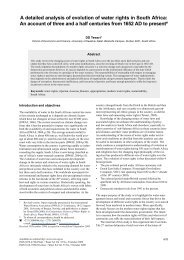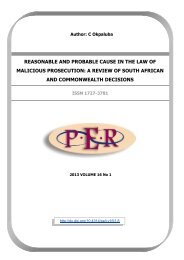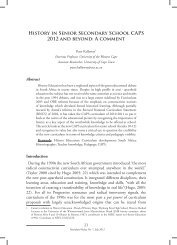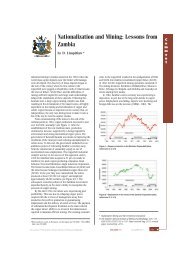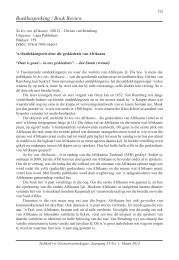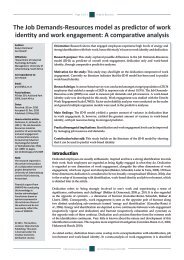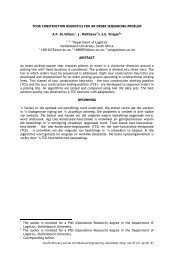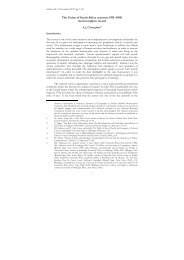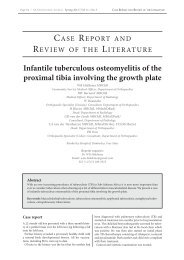Frances Baard's and Helen Joseph's struggle against apartheid ...
Frances Baard's and Helen Joseph's struggle against apartheid ...
Frances Baard's and Helen Joseph's struggle against apartheid ...
You also want an ePaper? Increase the reach of your titles
YUMPU automatically turns print PDFs into web optimized ePapers that Google loves.
Musiiwa - <strong>Frances</strong> Baard’s <strong>and</strong> <strong>Helen</strong> Joseph’s <strong>struggle</strong><br />
joined the Congress Alliance later. At that time it was only the ANC, the Coloured<br />
Congress, the Indian Congress <strong>and</strong> the Congress of Democrats. 78<br />
But she tends to challenge this fluidity when she interprets the colour of the ANC flag:<br />
It looked so good, all these women in uniforms, green, yellow <strong>and</strong> black, the same as the<br />
ANC flag. Black for us, the black people of the country, green for the green pastures, <strong>and</strong><br />
yellow (it was not actually yellow; it was gold) for the gold underneath. And we would sing<br />
too. Hawu! We were so proud in those uniforms. 79<br />
If black on the flag symbolised the black people of the country, how did Baard perceive<br />
people of other races with whom she fought <strong>against</strong> <strong>apartheid</strong>? Baard’s racist stance, as<br />
expressed in her pride over the ANC flag, invokes an investigation into changes in ways<br />
Baard <strong>and</strong> Joseph conceptualised unity among all South Africans, <strong>and</strong> diversity in that<br />
unity. What were the other races fighting for if the colour of the flag does not represent<br />
them?<br />
Conclusion<br />
The foregoing has been an attempt to evaluate the pros <strong>and</strong> cons of using personal<br />
narratives as a methodological approach in writing comparative women’s history.<br />
Personal narratives give important insight into the complexity of reality <strong>and</strong> the<br />
contradictory ways in which women have conceptualised <strong>and</strong> coped with historical<br />
changes. Their major contribution has not been the retrieval of women’s experiences, but<br />
the ability to read <strong>and</strong> play out the complexity of women’s sentiments <strong>and</strong> consciousness.<br />
Use of personal narratives in comparing women’s experiences across gender, race <strong>and</strong><br />
class is not without problems. The subjective ‘I’ carries different connotations in life<br />
histories, autobiographies <strong>and</strong> diaries, culminating in the production of what one might<br />
call “situated knowledge”. If knowledge is situated in people’s diverse perceptions of<br />
their social locations, subjective narratives of women’s experiences retrieved from<br />
different forms of personal narratives have a bearing on comparisons that can be drawn<br />
on women’s historical experiences. Nevertheless, such problems do not render personal<br />
narratives a useless methodology in comparative women’s history. African women’s life<br />
histories <strong>and</strong> autobiographies do not seem to show much difference in their use of<br />
phenomenology.<br />
Abstract<br />
Women’s personal narratives constitute the core of historical inquiry in women’s history<br />
even though the category “woman” has been contested <strong>and</strong> redefined at different levels<br />
in different cultures. The article purports to provide a general overview of prospects <strong>and</strong><br />
problems of autobiographies <strong>and</strong> life histories as a methodology of writing comparative<br />
women’s political history. The article argues that the differences in the ‘I’ that is spoken<br />
of as a retrospective product in life histories, <strong>and</strong> the ‘I’ that speaks for itself as a<br />
retrospective cumulative experience in autobiographies, has a bearing on the kind of<br />
knowledge that scholars produce on comparative women’s political history. It is<br />
significant to note that while it is possible to blur boundaries <strong>and</strong> draw comparisons on<br />
women’s experiences, the nature of the knowledge produced by using different personal<br />
narratives has a bearing on the levels at which similarities of such experiences are drawn.<br />
78. Baard <strong>and</strong> Schreiner, My Spirit is Not Banned, Part 2, “The Congress of the People”.<br />
79. Baard <strong>and</strong> Schreiner, My Spirit is Not Banned, “Introduction”.<br />
80



